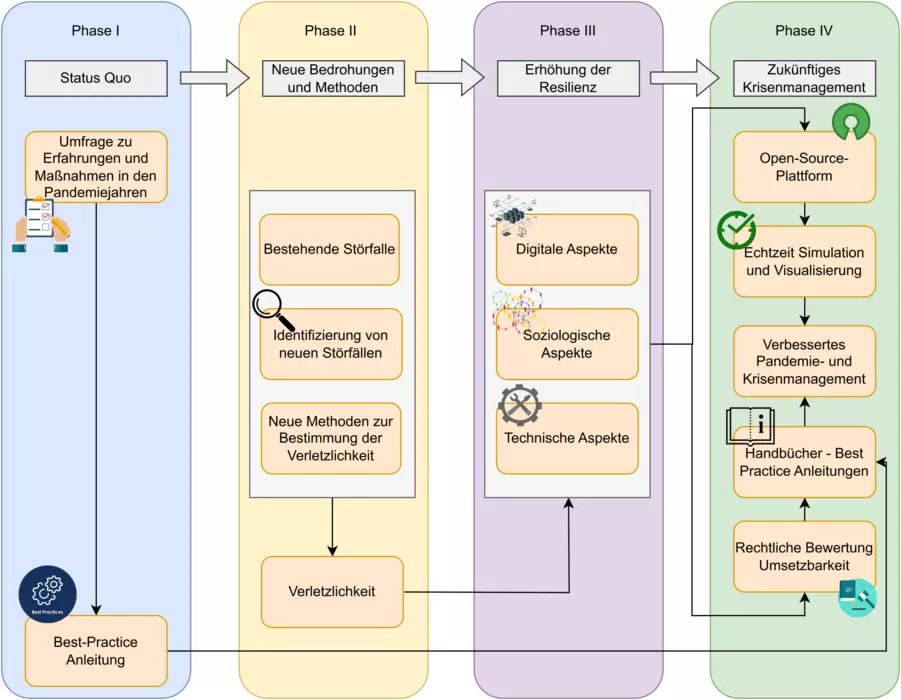RESIST
Digital pandemic and crisis management in the drinking water supply

The project is funded by the Austrian funding programme for security research (KIRAS) of the Federal Ministry of Agriculture, Spatial Planning and Tourism (BMLRT) (FO999886338).
Project partner:
- Austrian Association for the Gas and Water Industry (ÖVGW)
- Stadtwerke Schwaz GmbH
- University of Innsbruck - Institute for Public Law, Government and Administration
- University of Innsbruck Institute for Sociology
- Wasser Tirol - Dienstleistungs-GmbH
- ZetaLabs IT-Service
Authorised representative: Robert SITZENFREI Martin OBERASCHER, Rahul SATISH
Project duration: 01/2022 - 12/2023
Brief description:
A reliable and safe centralised water supply is an important pillar of any society. The initial restrictions in spring 2020 presented the water supply companies (WVU) with new challenges (e.g.: significant spatial and temporal changes in water demand in the supply network, pronounced spring drought, switch to emergency operation, personnel management and quarantine). Small and medium-sized water supply companies in particular (approx. 41% of the population is supplied with drinking water by small structures) lack the resources, the necessary knowledge and personnel for efficient emergency management.

In order to enable efficient crisis and pandemic management for small and medium-sized water supply companies, a survey of the experiences and measures taken in spring 2020 among Austrian water supply companies (larger water supply companies in urban structures in particular have developed efficient crisis procedures) will be carried out in the first phase of the project. The results will be used to create best-practice guidelines, adapted to all WVU sizes, and to revise existing guidelines (e.g: W74 - Emergency drinking water supply - Successful crisis management in the water supply sector).
Progressive digitalisation in the field of urban water management (e.g. digital water meters, pressure and quality sensors) enables continuous monitoring of system statuses, allowing innovative approaches to be developed for pandemic and crisis management. However, integrative resilience considerations (digitalisation as a crisis tool but also additional risk potential due to multiple access points) have not found their way into either the literature or practice. Therefore, in the second project phase, the risk, vulnerability and resilience of the existing infrastructure in Austria (in particular small and medium-sized utilities) to digital incidents will be examined on a system basis and the opportunities for efficient crisis management through digitalisation will be determined. In addition to classic crisis scenarios (e.g. contamination, cyber-physical attacks), newly defined incidents in the course of the pandemic, such as (1) exit restrictions - changes in consumption, (2) pathogens transmissible via drinking water, (3) uncoordinated withdrawal of drinking water for storage purposes (similar to hoarding purchases of toilet paper) and (4) loss of knowledge due to personnel changes (quarantine, generational change), are systematically analysed and possible solutions developed. It is also important to consider cross-incident scenarios, e.g: Exit restriction and cyber-physical attack. Building on this, innovative technical, socio-technical and digital approaches for incident management to increase resilience are then developed on the basis of models, their functionality is checked and their suitability is tested in selected case studies.
The best-practice applications from project section 1 will then be used as a template to prepare the results from project section 2 for the operators of water supply companies as manuals or guidelines for a wide range of crisis scenarios.
Other links:
Articles in journals and conferences:
- Sitzenfrei, Robert; Diao, Kegong; Butler, David (2022): Resilience of Interdependent Urban Water Systems. In: Water 14/3, No. 440 (DOI).
- Satish, Rahul; Oberascher, Martin; Rief, Silvia; Sitzenfrei, Robert (2023): The socio-technical impacts of uncontrolled drinking water storage in households on the supply reliability. In: The 19th International Computing and Control for the water Industry Conference (CCWI). De Montfort University (Leicester).
- Lindenthaler, Thomas; Oberascher, Martin; Satish, Rahul; Hajibabaei, Mohsen; Sitzenfrei, Robert (2023): Hybrid approach to identify critical pipes in water distribution networks. In: The 19th International Computing and Control for the water Industry Conference (CCWI). De Montfort University (Leicester). (Weblink)
- Satish, Rahul; Lindenthaler, Thomas; Dastgir, Aun; Hajibabaei, Mohsen; Oberascher, Martin; Sitzenfrei, Robert (2023): Graph-based method for analysis of multiple pipe failures in water distribution networks. In: EGUsphere: EGU - General Assembly 2023 - Book of Abstracts. 23-28 April 2023, Vienna. Göttingen: Copernicus, EGU23-376. (DOI)
- Sitzenfrei, Robert (2023): A Graph-Based Optimisation Framework for Large Water Distribution Networks. In: Water 15/16, No. 2896. (DOI)
-
Oberascher, Martin; Schartner, Lukas; Sitzenfrei, Robert (2023): Optimisation of Small Hydropower Units in Water Distribution Systems by Demand Forecasting. In: Water 15/22. (DOI)
-
Hajibabaei, Mohsen; Yousefi, Azadeh; Hesarkazzazi, Sina; Minaei, Amin; Jenewein, Oswald; Shahandashti, Mohsen; Sitzenfrei, Robert (2023): Resilience enhancement of water distribution networks under pipe failures: a hydraulically inspired complex network approach. In: AQUA-Water Infrastructure Ecosystems and Society 72/12, S. 2358 - 2376. (DOI)
-
Satish, Rahul; Oberascher, Martin; Sitzenfrei, Robert (2024): A graph-based exposure representation of elemental failures in alpine water distribution networks. In: EGUsphere: EGU - General Assembly 2024 - Book of Abstracts. Wien. (DOI)
Presentations:
- Speaker: Sitzenfrei, Robert: : Research project "RESIST" - Digital pandemic and crisis management in drinking water supply. ÖVGW Symposium Water Supply 2022, Vienna. Date: 04/02/2022.
- Speaker: Satish, Rahul Co-authors: Lindenthaler, Thomas; Dastgir, Aun; Hajibabaei, Mohsen; Oberascher, Martin; Sitzenfrei, Robert: Graph-based method for analysis of multiple pipe failures in water distribution networks. European Geosciences Union (EGU) General Assembly 2023, Vienna, 27 April 2023.
- Speaker: Satish, Rahul; Co-authors: Oberascher, Martin; Rief, Silvia; Sitzenfrei, Robert: The socio-technical impacts of uncontrolled drinking water storage in households on the supply reliability. 19th International Computing and Control for the Water Industry Conference (CCWI) 2023, Leicester, 06.09.2023.
- Lecturer: Oberascher, Martin; Co-authors: Lindenthaler, Thomas; Oberascher, Martin; Satish, Rahul; Hajibabaei, Mohsen; Sitzenfrei, Robert: Hybrid approach to identify critical pipes in water distribution networks. 19th International Computing and Control for the Water Industry Conference (CCWI) 2023, Leicester, 07.09.2023.
-
Lecturer: Satish, Rahul; Co-authors: Oberascher, Martin; Sitzenfrei, Robert (2024): A graph-based exposure representation of elemental failures in alpine water distribution networks.European Geosciences Union (EGU) General Assembly 2024, Wien, 16.04.2024
